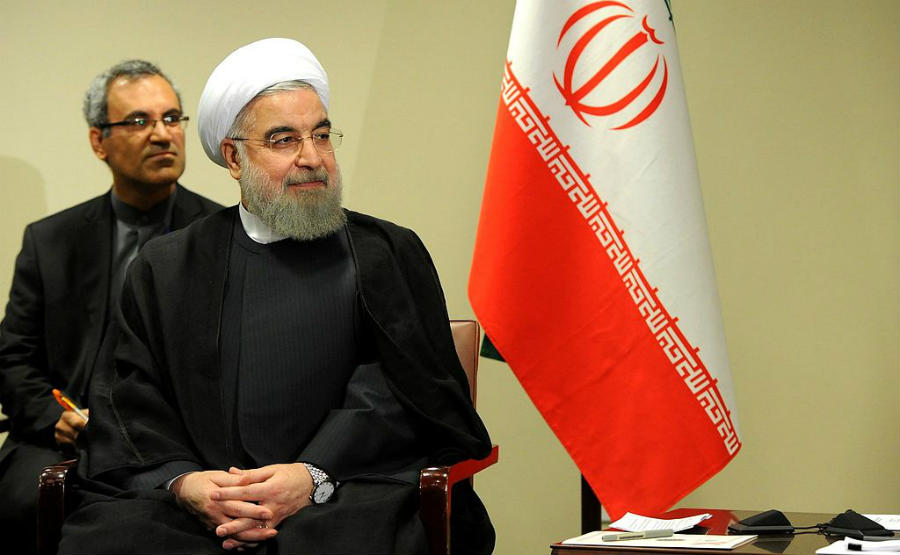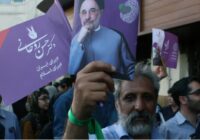Without a cooperative parliament, Rouhani will find it difficult to follow through on promises to restore the economy and enact human rights reform.
The election of President Hassan Rouhani in 2013 brought hope to many Iranians. The historic agreement on Iran’s nuclear program, its successful implementation and the lifting of many sanctions have raised hopes. However, should the February 26 elections for the Iranian parliament fail to bolster reformist forces in the country, true change and progress will be all but impossible, especially when it comes to human rights.
Rouhani came into office on a two-pronged platform. The first was to resolve the nuclear stand-off with the international community and reintegrate Iran into the global economy.
Critically, Rouhani’s second promise was to enact key human rights reforms within Iran. Rouhani has not always prioritized his human rights agenda. But when he has supported positive measures—whether allowing greater freedom of expression at universities, loosening Internet restrictions or lifting bans on women’s attendance at major sporting events—hard-liners have blocked him at every chance. Indeed, hard-liners still dominate most of the Islamic Republic’s major power centers, including parliament.
Win for Reformers
A reformist victory in the parliamentary elections will not bring about the sort of human rights sea change that some in the international community have been hoping to see after the nuclear deal. However, it would better position Iranians who have been working toward progress since Rouhani was elected. A victory now for the conservative ideologues, faithful to Supreme Leader Ayatollah Ali Khamenei, would see even Rouhani’s most minimal efforts continue to be blocked.
The deck is stacked against President Rouhani and his supporters. There is no free press for the reformists to circulate their ideas, exemplified by the Revolutionary Guard’s pre-election arrest of prominent reform-leaning journalists Issa Saharkhiz and Ehsan Mazandarani. Reformist candidates are often blacklisted from appearing in establishment media outlets. Their ability to band together in a united front is also hindered by restrictions on the freedom of assembly and on forming political organizations.
Looming also over this election is the fact that February marks the five-year anniversary of the house arrest of former reformist presidential candidates Mehdi Karroubi and Mir-Hossein Mousavi, as well as opposition leader Zahra Rahnavard. They were detained simply for challenging the fairness of Iran’s electoral system. Their release was one of Rouhani’s top promises, but instead, against Iran’s own laws, the opposition figures have remained imprisoned and have yet to be charged with a crime.
Equally disturbing, though, is that candidates for the 290-seat parliament must be approved by the Guardian Council, which is led by an anti-reformist ally of the supreme leader who has been openly hostile to Rouhani and his plans. Of the 12,000 individuals who applied to be candidates for the parliamentary elections, almost half of them were disqualified. In the first round of vetting in December 2015, reformists tried to flood the Guardian Council with 3,000 applications, hoping to overwhelm them into approving a greater number. Only 30 were approved.
The ultra-conservative Guardian Council is the supreme leader’s main tool to try to control the parliament and limit the ability of the president to act independently on domestic matters. This shows just how important it is for the parliamentary vote to go in favor of the reformists, and Rouhani as their de facto leader.
This is not to say a reformist parliament will automatically usher in an era of human rights reforms. For starters, the Guardian Council also has to approve all legislation, meaning it can, as it has consistently demonstrated, block any proposed human rights reforms. Still, there is a series of bills already on the parliamentary docket that would deeply impact, both positively and negatively, the human rights situation in the country, and the legislative body votes would be vital.
For example, the next parliament will likely vote on the political crimes bill, which would further criminalize public criticism of nearly every top official in the Islamic Republic, deepening limits on speech. There is also the comprehensive population and family excellence bill, which would undermine women’s right to work by requiring businesses to favor the hiring of men over women, and married people over unmarried people. On the positive side, there is a proposed legal amendment that would eliminate the death penalty for non-violent drug offences, which if passed could cut the number of executions in the country by half.
Win for Hard-Liners
President Rouhani is looking to move forward with ambitious plans for restoring the economy and improving the human rights conditions for the Iranian people. But without a cooperative parliament, he would almost certainly fail to even pass the budget he needs. If he cannot get basic spending policies passed, imagine the prospects for more controversial social policies, such as advancing women’s rights and lifting bans of Facebook and Twitter.
If Rouhani is not able to follow through on promises, the voters will inevitably turn against him. This outcome substantially raises the possibility of the return of someone like former President Mahmoud Ahmadinejad, who would most certainly close the possibility of substantive human rights reforms and undo many polices out in place by Rouhani. How long will the nuclear agreement hold up if hard-liners are swept into all the major positions of power?
Thus, the international community has a key role to play. Nations that embrace President Rouhani on the global stage and claim to care about the improving of Iran’s economy, human rights record and its standing in the world cannot remain silent. These governments should use their expanding bilateral diplomatic relationships to stress to Iranian authorities their obligation to ensure the freedoms of press, expression and assembly, and free and fair elections. Otherwise, this period of a reawakened Islamic Republic could be sadly short-lived.
The views expressed in this article are the author’s own and do not necessarily reflect Fair Observer’s editorial policy.
Photo Credit: Ryan Rodrick Beiler / Shutterstock.com / Kremlin
 We bring you perspectives from around the world. Help us to inform and educate. Your donation is tax-deductible. Join over 400 people to become a donor or you could choose to be a sponsor.
We bring you perspectives from around the world. Help us to inform and educate. Your donation is tax-deductible. Join over 400 people to become a donor or you could choose to be a sponsor.
Support Fair Observer
We rely on your support for our independence, diversity and quality.
For more than 10 years, Fair Observer has been free, fair and independent. No billionaire owns us, no advertisers control us. We are a reader-supported nonprofit. Unlike many other publications, we keep our content free for readers regardless of where they live or whether they can afford to pay. We have no paywalls and no ads.
In the post-truth era of fake news, echo chambers and filter bubbles, we publish a plurality of perspectives from around the world. Anyone can publish with us, but everyone goes through a rigorous editorial process. So, you get fact-checked, well-reasoned content instead of noise.
We publish 2,500+ voices from 90+ countries. We also conduct education and training programs
on subjects ranging from digital media and journalism to writing and critical thinking. This
doesn’t come cheap. Servers, editors, trainers and web developers cost
money.
Please consider supporting us on a regular basis as a recurring donor or a
sustaining member.
Will you support FO’s journalism?
We rely on your support for our independence, diversity and quality.







